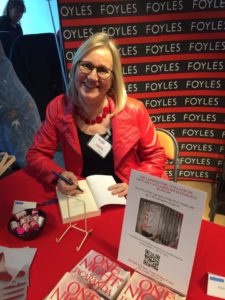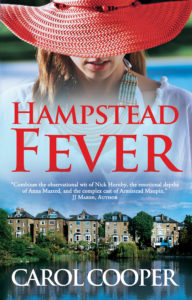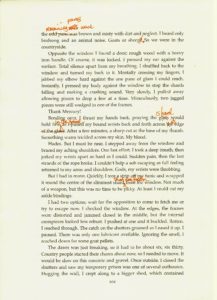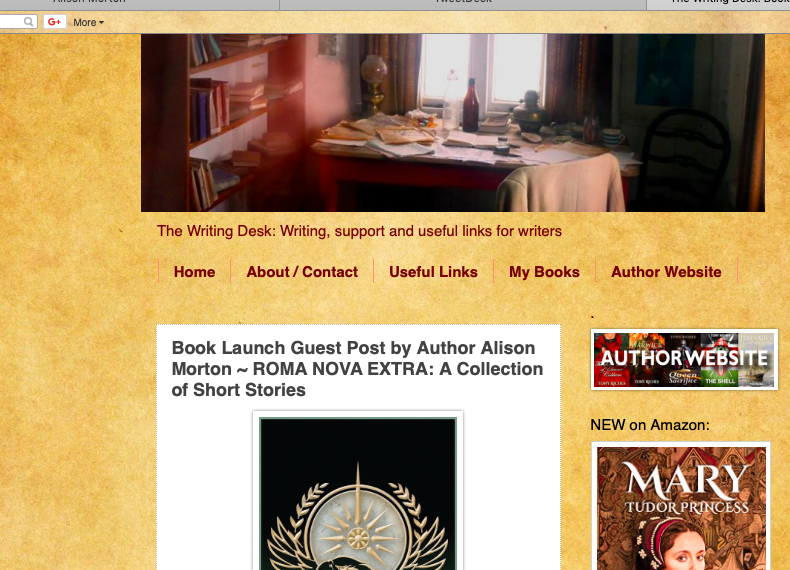 Today I’m delighted to welcome writing friend Carol Cooper to the blog. She’s an author, family doctor, and medical journalist. After a string of health books, she turned to writing fiction. Her novel Hampstead Fever featured in a prestigious front-of-store promo in WH Smith travel bookstores. Carol lives in Hampstead and Cambridge and is working on further books. Today I’m delighted to welcome writing friend Carol Cooper to the blog. She’s an author, family doctor, and medical journalist. After a string of health books, she turned to writing fiction. Her novel Hampstead Fever featured in a prestigious front-of-store promo in WH Smith travel bookstores. Carol lives in Hampstead and Cambridge and is working on further books.
Writers are always threatening to put people who’ve upset them in their next novel, but rarely do. Sometimes a coincidence is just that. But convincing people it’s not intentional? Over to Carol!
I’d always wanted to be an author, but my debut novel turned out to have unforeseen consequences. As soon as One Night at the Jacaranda was out, people asked if they were in my book.
Some assumed they were and went straight for, “Which one am I?” One reader believes she’s the stunning but self-doubting lawyer, and half a dozen friends insist they’re Karen, the single mother of four.
As for the doctor I’ve called Geoff in my novels, my husband Jeremy remains convinced it’s him. This despite the fact that Jeremy isn’t a medic and has no discernible similarities with my fictional GP, though someone did once mistake his name for Geoffrey at a party.
The bottom line is that none of the many characters I’ve written is anyone I know. Novels are fiction, goddammit. Yet no matter how often I repeat this, or point out the dinky disclaimers at the front of my books, some people still expect to find themselves in there, at least in a cameo role.
But why would an author put real people in novels, when it might be deemed to infringe someone’s privacy, or bring the risk of libel suits? Libel is a false statement – presented as fact and concerning a person – that causes damage to their reputation. Pointing out that a novel is a work of fiction may not even be enough to keep an author out of court, I’m told, so I’m not chancing it.
The closest I’ve got to using a real person is in Hampstead Fever, where I have a Jeremy Paxman lookalike striding into the lobby of Broadcasting House one late night, while Dan, my fictional chef, waits to be allowed into the studio with the platter of fish he prepared earlier.
 Signing books at Foyles I admit it’s tempting to incorporate people I know, like one particularly memorable patient from some thirty years ago. “You should write a novel about general practice,” said my then tutor as I returned from yet another house call.
Nonetheless, it would be wrong to use Mrs X or another of the other quirky characters I’ve met since I trained as a family doctor. Writing patients into books isn’t just breaking medical confidentiality. It’s stomping on it in hobnail boots, throwing it on a bonfire, then scattering the ashes to the four winds.
Then there are colleagues past and present: devoted, brilliant, arrogant, eccentric, disillusioned, or just drunk. No surprise I’ve included a doctor in both my novels to date, and there’s one in the next book too. My Geoff is going through a mid-life crisis and wonders if he really does make people better. I like to think he comes across as genuine.
All the same, he’s not based on any one person in particular. And he’s definitely not you, even if you’re burnt out, divorced, and estranged from your only child.
It’s as if readers can’t believe that anyone can conceive a novel with a multiplicity of characters and viewpoints without recruiting real people.
But the truth is, authors have fertile imaginations. We can sit all alone at our desks all day and dream up not just a cast of motley characters but entire worlds. My novels are contemporary and the worlds I create tend to be rooted in the here and now. I’ve squeezed yet another upmarket eatery into Hampstead’s iconic Flask Walk, without so much as a whisper to the planning authorities. That doesn’t make Lolo’s restaurant, where chef Dan toils in Hampstead Fever, any more than a fantasy.

All novelists use elements of their own experience to lend authenticity, which is different. That’s why my dramatis personae includes a struggling freelance journalist, anxious new parents, a young man diagnosed with cancer, a single mother who rarely has energy for anything more strenuous than lifting a glass of cheap wine, and a dazzling actress who takes part in clinical scenarios to help medical students learn bedside manners.
Novels aren’t real, but they should, I believe, be relatable. It’s what makes readers smile in recognition and keep turning the pages.
Thank you, Carol. I couldn’t agree more! And I loved ‘One Night at the Jacaranda.’
What’s Hampstead Fever about?

In a sizzling hot summer, emotions reach boiling point.
The lives of six Londoners overlap and entangle as each of them searches for love, sex, money, or just a respite from squabbling children.
Set in Hampstead, North London, this slice of contemporary urban life will especially appeal to fans of the film Love, Actually.
Amazon Kobo Apple/iBooks B&N Nook
Find out more and connect with Carol:
Blog: Pills & Pillow-Talk Twitter: DrCarolCooper Instagram: drcarolcooper
Website: drcarolcooper.com Facebook author page: Carol Cooper’s London Novels
Alison Morton is the author of Roma Nova thrillers INCEPTIO, PERFIDITAS, SUCCESSIO, AURELIA, INSURRECTIO and RETALIO. A Roma Nova novella, CARINA, is published 23 November 2017. Audiobooks now available for the first four of the series
Find out more about Roma Nova, its origins, stories and heroines… Get INCEPTIO, the series starter, FREE as a thank you gift when you sign up to Alison’s monthly email newsletter
If you enjoyed this post, do share it with your friends!Like this:Like Loading...
First you have an idea, then you think it through, conjure up characters or sometimes try to stop them yammering at you, then you imagine a setting and stir all together into a really sticky problem.

Several months later or sometimes a year later, out comes a typed manuscript. If you’ve chosen to go the indie publishing route, give up a social life, television and sleep. Now you enter the world of running a business or at the least managing a complex major project. Think ‘Grand Designs’.
Commissioning a cover
Ah! First you need to think about what image you want to project, what brand to create for your work. What concept is behind your book? What image or idea will the cover convey?
The design will kill or make your book, so you need to be clear about these things. This is your chance to wander into bookshops and surf online book stores to see what is attractive in your genre and call it ‘work’.
Next you will need to listen to your chosen cover designer who may want to do something different. The professional ones tend to know what sells and what doesn’t while still producing a creatively satisfying window into your work. But you will need to work with them, contributing without being insistent or protective. You will need good communications and an eagle eye to check each round of cover proofs. Oh, and you’ll need to work up some super-enticing back cover copy, and, if possible, some supportive endorsements.
 Editing and proofreading Editing and proofreading
Realistically, schedule 4-6 weeks, depending on whether you have booked your editor in time. You will have self-edited anyway and sent out the manuscript to your critique partner, beta readers, street team or writing circle, before the final version goes to the professional (paid for) editor. I usually have three rounds before going to the copy editor. This takes time and concentration; none of it should be skimped. After the copy edit and revisions, your book is formatted and then comes proofing. By now, you are so fed up with the manuscript, you want to hide under the table, but no, you have to gather up your grit (as my heroine Carina says) and get on with it, meticulously. If you really, really can’t bear to face it, commission a professional proofreader.
Formatting
Now your book is taking shape. You can use a formatter (human being) or risk uploading it as a Word document to a distributing retailer and let their software produce a file, or format it yourself with publishing software. Set aside time for this and for making cups of tea to refresh your patience.
I use Vellum software which does all the hard work for you with a range of pre-set templates, but which you can (if you are fussy geek like me) tweak to produce all kinds of different effects.The beauty is that you can play with it before you buy. Although you can use the same Vellum file for ebook and print versions, I use separate files as I like things in different order in the different formats. I allow plenty of time for this stage, but I have to say, it always takes less time than I’ve budgeted for.
Now you have to proof the files Vellum has generated before you upload them to distributors and retailers (see above).Your eyes will go into bulge and red-rim mode again and you may have to do corrections and last minute tweaks. When completely sure (and I never am, but time presses), order your print proofs.
Pre-launch stuff
 Tony Riches’ The Writing Desk blog While you’re waiting for copy-edits or structural edits or beta readers and at least 4-6 weeks before publication date, you spend days at the email coalface contacting all the friends, fellow authors, bloggers and reviewers you know to ask for their help launching your treasure. You will have set up a spreadsheet, of course, to track it all to include name, email, website, what you agree on after a little negotiation (guest post, review, Q&A), date agreed, date drafted and date sent.
When the post is published on that person’s blog, you then should tweet, post on Facebook or wherever and check back for comments, especially if you offer a giveaway of your book. And enter the URL in your spreadsheet so you can repost/retweet in a few weeks’ time without scurrying around the Internet.
Next, write those guest posts, and send them in with appropriate images at least a week before the due date. Nothing annoys bloggers more than receiving the material the day before!
Write posts on your own blog about research, motivation, character studies, and post short extracts. Set up tweets and posts, etc. in the week or two before publication date including little graphics sporting a ‘Pre-order now’ sticker. And if you have a spare moment (falls over laughing), set up tweets, etc. for publication day itself.
The day or two before publication….
Get some sleep. You’ve done the heavy lifting for now. The odd tweet, a last minute blogpost, chatting in groups – these are all pleasures of the ‘lull’.
Publication day
 And breathe… And breathe…
You’ll post on all your social media that your book is out, chat to fans who bought your book on pre-order, perhaps host an online party and generally bask in congratulations. A glass of bubbly is completely allowable even at 10 a.m.
There are zillions of books and tons of advice about publication day events, so I won’t duplicate them here, but for indies, this is just the start. Your blog appearances are beginning, and you’ll need to keep up with those hosting websites. Reviews will come in and you’ll move onto he next phase of marketing.
What?
Post-launch marketing
This phase lasts years, possibly into infinity. ‘Long tail marketing’, or continuous marketing, is normal in the indie world as you control it. Your work is not sidelined after a few weeks to make way for the next author’s launch. You are the star of your own show. I still market my first trilogy, especially my first book, INCEPTIO; that’s five years old and it still attracts five star reviews from new readers.
 But you’re still going to have to keep up the hard work. Oh, and write the next book at the same time. But you’re still going to have to keep up the hard work. Oh, and write the next book at the same time.
ROMA NOVA EXTRA, a collection of short(-ish) stories ranging from 270 AD to 2019 is available now as an ebook on Amazon, B&N Nook, Apple/iBooks and Kobo and as a paperback from your usual bookshop.
Alison Morton is the author of Roma Nova thrillers – INCEPTIO, CARINA (novella), PERFIDITAS, SUCCESSIO, AURELIA, NEXUS (novella), INSURRECTIO and RETALIO, and ROMA NOVA EXTRA, a collection of short stories. Audiobooks are available for four of the series.Double Identity, a contemporary conspiracy, starts a new series of thrillers. Double Pursuit, the sequel, is now out!
Find out more about Roma Nova, its origins, stories and heroines and taste world the latest contemporary thriller Double Identity… Download ‘Welcome to Alison Morton’s Thriller Worlds’, a FREE eBook, as a thank you gift when you sign up to Alison’s monthly email newsletter. You’ll also be among the first to know about news and book progress before everybody else, and take part in giveaways.
If you enjoyed this post, do share it with your friends!Like this:Like Loading...
 Much as we moan about marketing emails, Facebook adverts, stuff pushed into out letterboxes, we are very lucky to live in the information age. Honestly. Much as we moan about marketing emails, Facebook adverts, stuff pushed into out letterboxes, we are very lucky to live in the information age. Honestly.
As a child, I used to have to look up topics in the ginormous Encyclopaedia Britannica at home, cycle to the local reference library or write off to organisations and companies. Then there’d be hours making copious notes, shelling out for postage or photocopying (if you were lucky) and then waiting. And waiting….
Today, all we do is tap a few keys and hey, presto! Pages and pages appear in front of our goggling eyes. Now, there’s a lot of rubbish out there, but amongst it there are expert sites, photos, access to university research, virtual visits to the world’s wonders, even direct contact with astronauts circling that world. Somewhere, there is information about everything.
But… (You know me 🙂 )
The biggest problem is overload. Where do we start?
I’ve found that if I sit down and make a list of what interests me, what I’d like to be updated on, whose blog I find amusing, informative or thoughtful, I can weed out all the extraneous stuff. This is also the hardest step. But once decided, you can then choose which information you want to receive and ditch the rest, usually via the spambox. If you receive emails from a list you didn’t subscribe to, that’s now illegal in the EU.** But perhaps you’re like me and have forgotten what you signed up to. Just use the unsubscribe link. If there isn’t one, report the sender to your local data protection agency.
Turning it round the other way, I’d rather have 400 interested and participating newsletter subscribers than 40,000 who just clicked for the free book. Numbers aren’t everything (although 40,000 engaged subscribers would be lovely!).
So what would you get from signing up to my newsletter?
1. You join an established and select team – you get involved, you can share your thoughts.
2. You stay in the loop. In the age of info overload, subscribing means you’ll never miss out on what you actually want to see.
3. You read the latest info from Ancient Rome including photos (Yes, history changes continuously.).
4. Free stuff and offers, the occasional competition plus the opportunity to join the Roma Nova Reviewers club
5. Early news about new releases and sneak peeks
6. Guests who have something interesting to say, not just spammy PR posts
7. It’s once a month, so regular but it doesn’t flood your inbox.
8. Fully compliant with GDPR, so your personal data is safe.
9. And as a thank you for signing up, you can download ‘Welcome to Alison Morton’s World of Thrillers’, a FREE ebook containing two short stories, one the prequel to new thriller Double Identity, and the other an adventure in modern Rome for Carina and Conrad two prominent characters in the Roma Nova story.

I don’t spam you, nor guilt you out, nor over-promise. WYSIWYG* is probably a bit old fashioned and geeky now, but this is exactly what you get in my thriller world. See you soon!
*What You See Is What You Get.
** Just to reassure you, EU GDPR applies within the European Union and to me and my sites as I’m resident in France. A new UK law very similar now applies. More info here: https://ico.org.uk/for-organisations/dp-at-the-end-of-the-transition-period/transition-period-faqs/#brexit
Alison Morton is the author of Roma Nova thrillers – INCEPTIO, CARINA (novella), PERFIDITAS, SUCCESSIO, AURELIA, NEXUS (novella), INSURRECTIO and RETALIO, and ROMA NOVA EXTRA, a collection of short stories. Audiobooks are available for four of the series.
Find out more about Roma Nova, its origins, stories and heroines and taste the latest contemporary thriller… Download ‘Welcome to Alison Morton’s Thriller Worlds’, a FREE eBook, as a thank you gift when you sign up to Alison’s monthly email newsletter. You’ll also be among the first to know about news and book progress before everybody else, and take part in giveaways.
If you enjoyed this post, do share it with your friends!Like this:Like Loading...
 Writing friend Keith Dixon asked me in one of those round robins on Facebook to share five writing tips, but without copying his (curses!). Writing friend Keith Dixon asked me in one of those round robins on Facebook to share five writing tips, but without copying his (curses!).
After nine, soon to be ten, books you’d think it would be easy, but the problem is that over that time, I’ve gathered a jumble of writing dos and don’ts. It probably did me a lot of good to sit down and write down some of the essential ones! Here are my five:
1. Bash your story out. We know that editing, refining, honing, etc. are crucial for a good story, but you have to have something to work on. First drafts are always crap, to use a technical term, but give you an initial framework. And it can be fatal if you stop to edit as you go as you can easily lose the flow of your story. and it’s the story that always counts.
2. Research round your subject, period and environment but don’t get caught in research thrall. When you have a good general grasp of these three, start writing. You will inevitably need to look up specific things (how different is a Glock 17 from a Glock 26 and does it matter?) but just mark the place in your text with something (asterisks, emojis, different coloured text, whatever) and go back at the end of your writing session to fill these in.
3. Avoid long passages of description. Readers are not daft and half the pleasure of reading is forming your own picture in your mind of what the author is writing. The convention these days is to start right your story in the middle of the action – ‘in media res‘ if you want it in Latin. I have to confess that having to wade through a lot of verdant forest or dull city streetscape for two or three pages before anything starts or a character pops up does put me off a book these days.
4. Get your money’s worth out of your characters. I have a lot of characters, but none of them is there without a purpose and I often bring them back later in the story or in another story in the series. Doing this with secondary characters (e.g. Lurio, Flavius, Paula Servla in the Roma Nova series) reinforces interactions with the main ones, and the world they live in. As a reader, I love glimpses of such ‘old friends’.
5.Give your characters food, rest and a loo break. They need to wash themselves and their clothes, change shoes, put on a warm jacket. Readers like characters who, however clever or courageous, do stuff they do. Habits help define and reinforce characters and their emotional reactions; Aurelia reaches for French brandy, Carina for coffee or Castra Lucillan white wine, Conrad for whisky. But be very sparing; you can use these actions as beats, pauses or in place of dialogue tags. But no cups of tea every chapter, please.
So, do you have any favourite ‘quick ‘n’ dirty’ writing tips?
Alison Morton is the author of Roma Nova thrillers – INCEPTIO, PERFIDITAS, SUCCESSIO, AURELIA, INSURRECTIO and RETALIO. CARINA, a novella, and ROMA NOVA EXTRA, a collection of short stories, are now available. Audiobooks are available for four of the series. NEXUS, an Aurelia Mitela novella, will be out on 12 September 2019.
Find out more about Roma Nova, its origins, stories and heroines… Download ‘Welcome to Roma Nova’, a FREE eBook, as a thank you gift when you sign up to Alison’s monthly email newsletter. You’ll also be first to know about Roma Nova news and book progress before everybody else, and take part in giveaways.
If you enjoyed this post, do share it with your friends!Like this:Like Loading...
 Dozy (No offence to ostriches) I love the Internet; its variety, its information, its madness, its connectivity and above all its denizens. I belong to groups, lists and forums, many of them inside Facebook, some on Twitter, some on email. After being on Twitter since 2009 and Facebook since 2011, I’ve sifted out amusing people, good contacts, reliable sources of information. These are continuing pleasures.
But ever more, I’m starting to see two particular denizens growing in number – Lazy and Dozy.
Dozy can be forgiven to an extent; perhaps they’re new to the ever more complex Internet, they aren’t a frequent visitor, they’re time-strapped, they’re not a geek, just a normal person. But I’d suggest they pay attention to other people’s contributions first and try lurking a little before butting in or leaping in with inane questions or irrelevant points.
Dozy doesn’t read preceding threads where the answer to their question may lie, or where somebody has already made the point in an informed way. Dozy often quotes headlines from the Daily Fail, the Daily Distress or the Dumb newspapers or bogus Facebook groups or blogs. They don’t check where the info comes from, they don’t think what impact their post or comment may have – confusion, hurt, even panic. And in the viral age, their misinformation can spread faster than the old-fashioned wildfire. And they can be the naive unwitting spreader of ‘alternative facts’.
 Lazy (No offence to seals) Now, Lazy is extremely annoying; they can’t be arsed to look up the simplest thing. Not only do they not read previous threads/conversations, they think their question or comment is so important that other people don’t have anything else to do but answer it. A classic: “Does anybody know the address of the Kent County Council?” My reply (if can be arsed to make one): “Google Kent County Council”.
Other manifestations are not reading the files in a group or not bothering to click through to a linked site or blog and read it themselves. I’ve posted blogposts on Roman life or history in appropriate Facebook groups and commenters have made a point or written a comment that exactly duplicates what I’ve written in that linked post. I’ve pointed it out and received the reply as a follow-up comment “Oh, I don’t bother reading blog posts these days.” as if it was a virtue. No, they are just content to make (sometimes fatuous) comments or they consider themselves too important to descend to reading the blog post.
Oh, and have I mentioned spelling and punctuation? “i really lik the dahvinchy code caus itsreallymisterious.” (Genuine!)
I hesitate here because I am a rubbish typist, but at least I review before I post or I go back and edit it as soon as I notice (or somebody else does!).
Neither Dozy nor Lazy thinks before they type. Neither takes responsibility for what they post.
Now, everybody is 100% entitled to their point of view and has a right to comment. I take that as written. Reacting quickly is part of the fun of the Internet, especially on Twitter and the odd typo is forgiven. But nobody has the right to be Lazy or Dozy. In the end, they will embarrass themselves and look useless to others, but sometimes not before they have annoyed, mis-informed or hurt others.
How to avoid being Lazy or Dozy
- Read the thread/previous comments
- Be original
- Quote your source and make sure it’s credible
- Click through to the linked blogpost before commenting
- Use Google for easy questions
- Check the ‘About’ section, the pinned post and the Files section in a group first
- Use humour appropriately
- Make your headline enticing but not clickbait-y
- Learn from what others say
(Yes, I’ve used the neutral ‘they’; Lazy and Dozy are found in all genders.)
Alison Morton is the author of Roma Nova thrillers – INCEPTIO, PERFIDITAS, SUCCESSIO, AURELIA, INSURRECTIO and RETALIO. CARINA, a novella, and ROMA NOVA EXTRA, a collection of short stories, are now available. Audiobooks are available for four of the series. NEXUS, an Aurelia Mitela novella, is now out.
Find out more about Roma Nova, its origins, stories and heroines… Download ‘Welcome to Roma Nova’, a FREE eBook, as a thank you gift when you sign up to Alison’s monthly email newsletter. You’ll also be first to know about Roma Nova news and book progress before everybody else, and take part in giveaways.
If you enjoyed this post, do share it with your friends!Like this:Like Loading...
|
Subscribe to Blog via Email
Join 368 other subscribers.
Categories
Archive
|
 Today I’m delighted to welcome writing friend Carol Cooper to the blog. She’s an author, family doctor, and medical journalist. After a string of health books, she turned to writing fiction. Her novel Hampstead Fever featured in a prestigious front-of-store promo in WH Smith travel bookstores. Carol lives in Hampstead and Cambridge and is working on further books.
Today I’m delighted to welcome writing friend Carol Cooper to the blog. She’s an author, family doctor, and medical journalist. After a string of health books, she turned to writing fiction. Her novel Hampstead Fever featured in a prestigious front-of-store promo in WH Smith travel bookstores. Carol lives in Hampstead and Cambridge and is working on further books.























